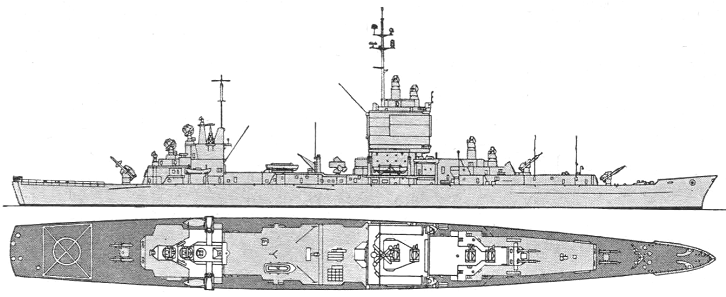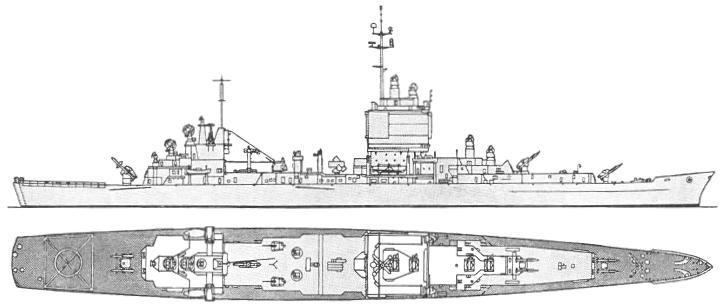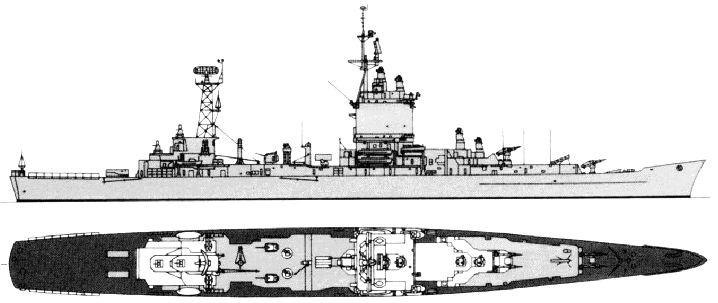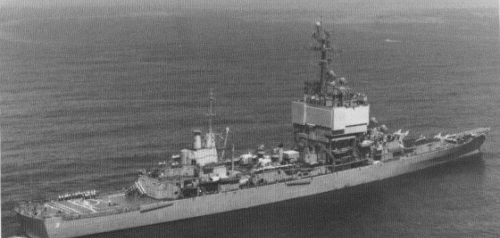

Ling Beach 1961

Long Beach 1963

Long Beach 1970

Long Beach 1991
| No | Name | Yard No | Builder | Laid down | Launched | Comm | Fate |
| CGN9 | Long Beach | 1669 | Bethlehem, Quincy | 2.12.1957 | 14.7.1959 | 9.9.1961 | stricken 5.1995 |
|
Displacement standard, t |
14200 |
|
Displacement full, t |
16602 |
|
Length, m |
210.4 wl 219.9 oa |
|
Breadth, m |
22.3 |
|
Draught, m |
7.30 |
|
No of shafts |
2 |
|
Machinery |
2 sets General Electric geared steam turbines, 2 C1W reactors |
|
Power, h. p. |
80000 |
|
Max speed, kts |
30 |
|
Fuel, t |
nuclear |
|
Endurance, nm (kts) |
practically unlimited |
|
Armament |
1 x 2 Talos SAM (52 RIM-8), 2 x 2 Terrier SAM (120 RIM-2), 1 x 8 ASROC ASuR (20 RUR-5A), 2 x 3 - 324 Mk 32 TT, helicopter deck |
|
Electronic equipment |
SPS-32, SPS-33, SPS-10C, 2x SPG-49/SPW-2, 4x SPG-55C radars, SQS-23 sonar, WLR-1, WLR-3 ECM suites, 2x Mk 28 decoy RL, NTDS CCS |
|
Complement |
1107 |
Project history: Intended at first as a nuclear frigate, this ship grew in the design stage to large cruiser size; indeed, she was the only cruiser (of traditional size) built as such by the US Navy after the war. She shared with Enterprise the futuristic fixed-array SPS-32/33 radar system, and has an SQS-23 long-range sonar in her bow, with the associated ASROC launcher amidships, as well as a pair of single 127mm/38 guns, which were not part of the original design. She combined a pair of Terrier launchers forward (one with forty, one with eighty missiles) with Talos aft (fifty two missiles, as in the Albany), and had a two-reactor power plant. Although Long Beach was a substantial ship at over 14000t, she stands in contrast to much larger nuclear cruisers proposed in the mid-1950s with four-shaft plants more closely approaching traditional cruiser power. Polaris or Regulus II was included in the original design, but neither was installed. The C1W reactors installed are reportedly very similar to the A2Ws of the Enterprise, presumably somewhat uprated, as total Enterprise power is reported as 280000shp.
The SPS-32/33 radar system was combined with one of the earliest NTDS installations. In 1968 a conventional SPS-12 air search radar was added, partly because of maintenance difficulties with the fixed radars, and partly because the fixed sets did not have any integral IFF. A 1970 modernization provided integral IFF and digital Talos fire control. A proposal for Aegis conversion was rejected in 1977, reportedly out of concern that it would have jeopardised the Strike cruiser programme itself.
Modernizations: 1963: + 2 x 1 - 127/38 Mk 30, 2x Mk 35 radars
1968: + SPS-12 radar
1978: - 1 x 2 Talos SAM, 2x SPG-49/SPW-2 radars; + 2 x 4 Harpoon SSM (8 RGM-84A)
3/1983: - 2 x 2 Terrier SAM, SPS-32, SPS-33, SPS-10, 4x SPG55C radars, SQS-23 sonar, WLR-1, WLR-3 ECM suites, 2x Mk 28 decoy RL; + 2 x 4 Tomahawk CruM (8 BGM-109A), 2 x 2 Standard SM-2ER SAM (120 RIM-67), 2 x 6 - 20/76 Mk 15 Phalanx, LN-66, SPS-48C, SPS-49, SPS-67, 4x SPG-55D, 2x Mk 90 radars, SQQ-23B sonar, SLQ-32(v)3 ECM suite, 4x Mk 36 SRBOC decoy RL
Naval service: No significant events.

Long Beach 1980
© Ivan Gogin, 2015